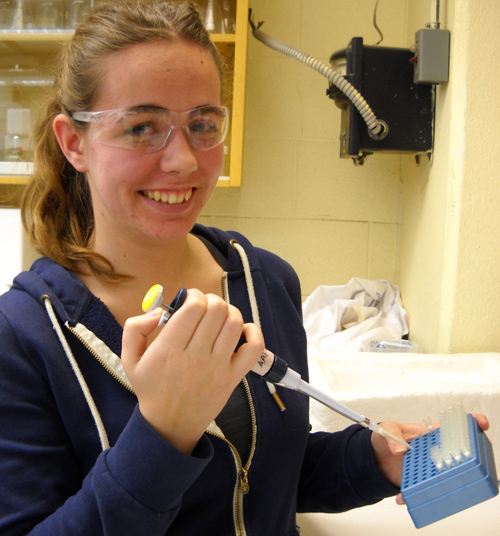
Corn and beans aren’t the only things growing in U of G’s Department of Plant Agriculture. Faculty members here are also nurturing tomorrow’s researchers, such as fourth-year undergraduate Sarah McClymont.
She’s still a few months away from graduating with a biological science major and a minor in educational psychology. But she has already racked up hours’ worth of work in two busy plant agriculture labs, research that has earned her co-authorship of four journal articles. And she’s picked up plenty of teaching experience from leading study groups and tutoring sessions in campus residences.
For McClymont, it’s been all U of G, all the time – starting with family visits to College Royal as a preschooler.
She was still attending biotech class at Guelph C.V.I. when she applied for a lab position at the University. Initially she’d been looking at a lab in Molecular and Cellular Biology.
She ended up in the Crop Science building, working with Prof. Manish Raizada on corn genetics and nutrient use.
Since then, she has co-authored two published articles. One paper on nitrogen adaptation in modern and ancient corn plants appeared in the journal Crop Science in late 2011.
Using corn plants grown aeroponically – roots entirely exposed to air – the researchers found significant differences in the roots of plants given low or high nitrogen. Variations also showed up when they used modern and ancient lines of corn.
“Aeroponics is a plant system where roots grow in air,” she says. “You can see fine root physiology that normally gets damaged in soil or water.”
For that study, she hand-traced tens of thousands of fine root hairs under a microscope to create images for computer analysis. “I’m a very detail-oriented person.”
So novel was the Guelph scientists’ closed-loop mist-spraying system for aeroponic growing that they wrote a separate paper about the setup, published in Plant Cell and Environment.
McClymont is also co-author of two unpublished papers about nitrogen and phosphorus use in corn. For the latter, she grows plants in small tubes and uses a gel that changes colour, which tells her how much phosphorus the plants take in.
Her work has allowed her to practise basic genetic lab methods. She also gets into the field, including tending corn plants in Cambridge, Ont. There, she manipulates pollen to produce seeds to be grown in the Crop Science greenhouses. “I know more about corn than I ever thought I would.”
By helping plants use nutrients more efficiently, the researchers hope to help farmers save money and grow more food.
“I like the idea that our research is actually working toward something,” says McClymont. She says she appreciates the research opportunities here that few of her high school classmates have had.
She’s now breeding disease-resistant beans along with plant agriculture professor Peter Pauls and Ali Navabi, a research scientist with Agriculture and Agri-Food Canada in Guelph.
On the educational psychology side, McClymont is interested in memory and how students learn. Clear teaching – including the ability to make complex ideas simple – goes a long way, she says.
As an academic cluster leader in campus residences, she has advised first-year students on academic issues. She also helps run study sessions for genetics and calculus, and has tutored other Guelph students in science, math and statistics.
This year, she has helped a pilot cluster project through residence life for second-year students.
After she graduates this spring, McClymont plans to pursue medical genetics. She’s interested in gene regulation in human disease, especially intellectual disorders.